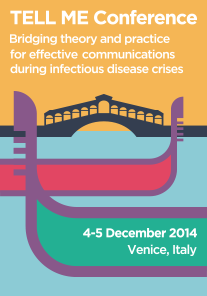The Stigmatising Effects of the Ebola Outbreak
 From a European perspective, the recent Ebola crisis has been portrayed as a health crisis that although in distant Africa, has the potential to spread to western states. It has been interspersed with intermittent panics where suspected cases are announced in European hospitals (which for the most part have shown to be negative upon testing). The result of the media, in drawing attention to the emerging threat of an Ebola outbreak, and the link with certain African countries, has fostered various forms of stigmatisation for those perceived as being connected to the event. Such stigmatisation can be felt both in the directly affected countries, in Africa as a whole and beyond. Such stigmatisation is able not to produce problems both in terms of hampering the public health response to the outbreak and exacerbating existing social and economic problems.
From a European perspective, the recent Ebola crisis has been portrayed as a health crisis that although in distant Africa, has the potential to spread to western states. It has been interspersed with intermittent panics where suspected cases are announced in European hospitals (which for the most part have shown to be negative upon testing). The result of the media, in drawing attention to the emerging threat of an Ebola outbreak, and the link with certain African countries, has fostered various forms of stigmatisation for those perceived as being connected to the event. Such stigmatisation can be felt both in the directly affected countries, in Africa as a whole and beyond. Such stigmatisation is able not to produce problems both in terms of hampering the public health response to the outbreak and exacerbating existing social and economic problems.
In terms of the effects upon countries where the outbreak is situated and the wider African continent, the stigma and fear produced by the outbreak has given rise to a number of harmful consequences. For individuals living in the countries involved, the stigma of being perceived to be connected with the outbreak is intense. Individuals from affected neighbourhoods face quarantine in their homes, making an already difficult and hard life even more difficult. The consequences of such stigma is that individuals are hesitant in coming forward with suspected symptoms or may try and conceal sick of deceased family from the attention of authorities. This facilitates further transmission of the virus and perpetuates the sense of fear and stigma surrounding it.
This sense of fear and stigma also affects the way in which foreigners are willing to deal with the countries in question. European airlines have for instance had to cancel flights to affected countries, often under pressure from the union representation of their employees who fear a risk of contamination. This has created not only economic problems for the countries involved but also major logistical headaches for international public health authorities attempting to manage an emergency public health response. In particular, such planners have found it difficult to move personnel and material to affected locations in a timely and efficient manner. This has, to a certain extent, hampered the response and aggravated attempts to bring the outbreak under control. Effects have also been noticed for countries as far afield as Kenya which has not had confirmed cases of Ebola. Cancelations affecting the tourist industry in countries that have a tenuous, or even no link with the outbreak, have had important economic repercussions for such developing economies that depend heavily on the industry.
The stigmatising effects of the Ebola outbreak have not been restrained to the effected countries or even the wider African continent however. Whilst the Ebola outbreak has hitherto failed to move beyond Africa, concern has been increasing in the European media about a perceived failure by the states directly effected to control the virus, increasing the risks that the virus will one day cause serious problems beyond also. The Ebola virus therefore adds itself to a general perception that Africa harbours numerous problems that are waiting to explode one day onto Europe’s shores. This perception has been fed by stories of the masses of African migrants that are attempting reach Europe, and past instances whereby African migrants were perceived as posing a higher risk in terms of certain established and emerging health problems including HIV and Hepatitis B. Such heightened risks translate into a risk of stigmatisation that can affect the quality of life for those involved. An key property of stigmatisation is that it can induce particular psychological states in individuals that can have negative effects for the individuals concerned, the groups they may belong to and even society as whole. This include the potential induction of negative coping mechanisms, including the desire to avoid painful or embarrassing circumstances or to hide signs of the membership of a group that is stigmatised (in this case their African origin). Such coping mechanisms can result in driving certain groups and their associated problems (including health issues) underground. This can result in a range of harmful circumstances, including healthcare avoidance and a reduced engagement with normal civic institutions. In addition where problems associated with stigmatisation are severe they can result in a reduced sense of self-esteem. This can reduce the ability of individuals to strive for their preferred path in life, resulting inter alia in a failure to utilise healthcare, education and employment opportunities. Whilst African migrants might be at a higher risk of such problems than the average European individual, the stigma surrounding such risks also impacts on the larger African community (including those that are not recent migrants but have been established for some time). Individuals in this latter group may have been established in western countries for some time, or even several generations and so as consequence may pose no greater risk that their average fellow citizens. The issues of stigmatisation created in a public health crisis, such as the outbreak of an emerging disease (as evidenced in exotic viruses Ebola), therefore represent an important aspect that should be considered by public health planners when charting a response to a public health crisis. The effects that such events are able to create demonstrate that they carry serious risks not only in terms of human health and economic costs, but also in terms of serious social harms that can be felt both at the epicentre of the outbreak and beyond.
Paul Quinn
Vrije Universiteit Brussel (VUB)
TELL ME project


